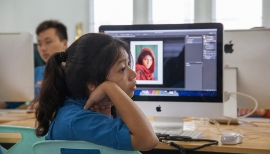THAILAND: Innovative Salesian Educational Programs Provide Skills Training for Poor and Marginalized Youth

(MissionNewswire) Salesian programs across Thailand focus on education and workforce development in partnership with social development services that work to meet the basic needs of youth and their families living in poverty within the country. Nearly 1,000 students attend each of the Salesian Professional Training Centers in Thailand. These centers mostly focus on students who have performed poorly in more traditional schools or have challenges with learning. Those that graduate from the Salesian training courses are able to immediately find a suitable job in the current marketplace because the programs taught are tailored to meet local demand.
“Salesian missionaries have been present in Thailand for many years, initially dealing with orphans and now managing schools, vocational training centers, parishes and oratories,” explains Giampietro Pettenon, procurator of Don Bosco Missions in Thailand.
In another innovative program, Salesian Father Carlo Verlado, the director of the Nonthaburi Skills Development Center for the Blind in Thailand’s capital, trains 40 students with visual impairments. These students embark on an intensive two-year educational program. When the program first started more than 35 years ago, students were taught trade skills in carpentry and woodworking. Some students were able to find work but many others were denied employment because local employers feared workplace injuries and were put off by the higher costs of insuring visually-impaired employees.
As a result, the program changed focus and in 1983 began training its students to be massage therapists. As an acknowledgement of the high-quality training offered and the program’s years of success, the Ministry of Public Health has begun to license graduates as doctors of Thai traditional massage. Most graduates are able to find work immediately and continue to hone their skills for many years. Through the program, the therapists-in-training see more than 150 clients each day.
“When I started the program, the blind were shunned and the common perception was that they could do only two things – sell lottery tickets or be telephone operators,” says Fr. Verlado. “Today, students are learning a valuable trade and living productive lives while giving back to their communities.”
Other programs at the school offer a comprehensive curriculum that goes beyond teaching a trade. In addition to gaining an education and learning valuable job skills, students participate in activities such as judo, baseball, bicycle riding and competitive running, all of which foster physical development and self-confidence.
Thailand has shown considerable economic growth over the last 20 years, reducing its poverty rate from 21 percent in 2000 to 10.9 percent where it currently stands now, according to the World Bank. Although the country has made strides in reducing poverty, improving nutrition and meeting basic needs of its residents, inequality is still pervasive. One of the more marginalized groups in the country is people with disabilities. Men, women and children with disabilities have been cast aside and perceived as incapable of engaging in meaningful work and leading productive lives. Often those with disabilities, particularly those with visual impairments, are kept out of school and denied an education. As a result, their future employment prospects are diminished and the cycle of poverty continues.
###
Sources:
ANS – Thailand – Professional Training for Thai and Vietnamese Youth
World Bank – Thailand




